Even if you don’t know her movies, chances are you know the name Lexi Alexander. A big name on social media (her twitter account is a must), she is the rare filmmaker who speaks openly and critically about Hollywood’s gender AND diversity problems…and has for years.
After working as a martial artist and stunt woman, German-born Alexander made an Oscar nominated short about a boxer (Johnny Flynton) and a independent film about football hooliganism titled Green Street Hooligans. Her success directing action on screen led to the ultra-violent, 80s action-inspired Punisher: War Zone. The first of Marvel Knights brand (Marvel’s Hard R films), the movie was released in theaters unceremoniously and sentenced Lexi to director’s jail. But in 2015, Lexi’s career saw a new start with three consecutive directing jobs: Arrow, Supergirl (tomorrow’s episode), and an upcoming episode of Limitless. We spoke (in an almost epic hour-plus interview) about directing for TV, her vocal and passionate activism toward diversity in Hollywood, the DGA’s depressing statistics, why she loves friend Patton Oswalt, and plenty more.
Lesley Coffin (TMS): This is the first year that you’ve been directing TV–starting with Arrow, then Supergirl, and now Limitless. How did this new move to TV directing come about?
Lexi Alexander: I’d been trying to get into directing for TV for years. And even though I knew a number of producers and showrunners, there always seemed to be a gate keeping me out. Moreso even than in features, no one wants to be the first person to hire you to direct an episode. It is very country club-like in that way. But I think that all diversity talk and ACLU investigation created a lot of noise about the need to shift that point of view.
And I can only speak about my own experiences, but last year a showrunner named Andrew Kreisberg tracked me down, as a fan of Punisher. And he hired me for Arrow. But later I found out, and he’s talked about this in interviews, that a statement came from Greg Berlanti that he doesn’t want his production company to be one of the companies that only hires guys, and wants to offer opportunities to people of color and women. So he told all his showrunners to go and do the work. So Andrew came to me to direct an episode of Arrow and it ended up being one of the showrunners’ favorite episodes (“Beyond Redemption”), and right after that aired, he hired me to direct this episode of Supergirl. And all that even lead to Limitless, because that came from the CBS camp, which airs Supergirl.
TMS: Has it been a case that once you get your foot in the door, or through the gate, shows are starting to come to you?
Alexander: This doesn’t usually happen. I was lucky enough to get in. But once I got in and started working, it was clear to everyone that I should have been doing this a long time ago. The first film I started with was a short film about a boxer that was 40 minutes long, and that was nominated for an Oscar (2002’s Johnny Flynton). I remember specifically making a film that was that length and that subject because I wanted to get into TV. Even then, before making any features, I wanted to direct TV. It just so happened that once I was nominated for an Oscar, my agents said “you have to make movies” and TV sort of fell to the side. But I’ve always been qualified to direct TV, I just didn’t have access to the country club.
Once I got in there, one of the things Andrew told me was, nobody realized how good I am at working with actors and directing drama. But I never had the chance to tell people. I’m not just a former stunt woman or kickboxing champion. I’ve studied acting methods of Stanislavaski and Meisner to prepare myself. I studied drama longer than most actors have. But that was a side nobody asked me about, and I guess nobody looked at my resume.
TMS: I think the term country club is a great term to use, especially with the current discussion about the Oscar’s lack of diversity, because to get in and have those opportunities, those running things need to be willing to let you in to try. Does Hollywood in general feel a bit like an exclusive country club?
Alexander: Oh yes, I think of it as a golf country club. It is amazing, because I’m not a director that had to be built up, it was almost slightly more insulting. Because there are young directors who do still need some training, and it’s good that they are slowing coming up, rather than doing three in a row. But when you bring someone in that is a pro and requires no hand-holding, and it turns out all along I just needed a bouncer to let me in, it feels even more unfair. I’ve spoken with Andrew about this a lot, that there are a lot of women that are great at directing, but are being unused.
TMS: Have you spoke with Andrew and Greg, or other showrunners, about some of the other directors you know that have been held back in similar ways?
Alexander: I have, but when Greg Berlanti gave Andrew the marching order, he really did his homework and found more female directors than I even knew. Besides hiring myself, he hired Rachel Talalay, who’d directed Doctor Who, instantly for The Flash and Legends of Tomorrow. And I know Rachel, but he also hired Alice Troughton, who directed the famous bottle episode of Doctor Who (the episode “Midnight”), and other women he approached (Wendey Stanzler, Hanelle M. Culpepper, Bethany Rooney, and Charlotte Brandstrom have all directed on the Arrow-Flash-Legends series). Andrew really did his homework.
But Rachel and I are friends and kind of fall in the same category, although she is better with visual effects, and I’m probably better at staging action. So I will constantly recommend her for jobs that I think she’d be better at. If I go in for a job and am told, our show is visual effects heavy, I’ll constantly ask “have you interviewed Rachel Talalay.” And I’ll mention other women. But I know a lot of female directors that would be great, but haven’t tried or been given the opportunity to direct TV and the first episode is hard and isn’t something I can easily recommend. But I’m working my way to a place where I can have people shadow me and then I can guaranteed that their episode will be fine, by me standing next to them.
TMS: Would you be interested in working on shows in the capacities as a producer, so you would have a voice in the boardroom during that decision making process?
Alexander: That is actually a goal I have. It’s been so interesting because since getting into TV, I’ve been meeting with a lot of executives that had heard about my diversity activism work. So I’ve taken all these meeting in the past few four months at studios, networks, production companies, and the people who want to speak to me about diversity ask me the same things. They want to know, what is it we aren’t doing, what do we need to do, and what do you think we have to do better? And I say, “the best way to make a meaningful change is in the position of PD, the producer-director.” They are such an experienced director, they are hired to stay on the show, and they are there not to look over the director’s shoulder, but to be there so if anything happened or question come up, the PD can step in to help. Even if the showrunner isn’t there. But that position can also lend itself to improving diversity among the directors, because they can vouch for directors and work with some less experienced directors. Because if something went wrong, which seems to be what everyone’s afraid of, the producer-director can step in any second. So that should be a position on every show, and they should be working on diversity. And as far as I’m told, from the CW executive Traci Blackwell, they are really working hard on the diversity issue and agreed with me that the PD position is something that could make a big change.
TMS: Since getting having these conversation with these executives and producers about diversity, do you believe that TV is in a better position than film?
Alexander: It’s thousands of miles ahead. I can’t even compare them at this point. Hollywood is like high school and now that I’ve done TV episodes with buzz, now I’m getting feature scripts again. As if something changed regarding my talent? It is so weird. It’s like high school, where if the cute boy asks you out, all of a sudden you’re back at the cool table. And that is how Hollywood works.
So I’m getting scripts again, and some of them aren’t bad. They are mid-range budget and brand names and stars attached, and my manager constantly tries to get me to go back to movies. But I finally said to her, it’s like telling me the male American football team locker room is finally going to let me in…as if I want to go back inside that sweaty, smelly, cursing locker room? It’s not a safe environment, it’s not a classy environment, and it’s not good to women…and it’s never been that good to women. That’s why the numbers still stink. They don’t want us, but frankly, a lot of us don’t want them either anymore. Whereas TV is a completely different arena. You have people like Shondra Rhimes, Jill Soloway. Women in charge, so female directors aren’t just being tossed aside.
TMS: It’s great that with Supergirl and Arrow and The Flash, women are getting to direct those shows. But the frustrating thing about the superhero films, for me at least, is we hear about highly qualified women in the running to direct Wonder Woman and Captain Marvel, but none of those women are mentioned when they talk about the director for The Justice League or next Spiderman films. It seems that with films, they only want female directors for “female-driven films” and it is the same with directors of color only being included when they announced films like Black Panther, Aquaman, and Shazam. I know you were mentioned during the Wonder Woman announcement, was it frustrating that you only seemed to be a contender when the story was about a female character?
Alexander: As you mentioned, in TV they’ve moved beyond that, because I did Arrow first and the main character in that show happens to be a man. And for me, it was very cool to direct Supergirl and work with a female lead for once, especially in a fight scene. But you are absolutely right. I did The Punisher, so I don’t know why my name only got thrown out for the Wonder Woman and Captain Marvels, but rarely get thrown out for the other stuff, when it’s just the dudes. And I’m always insulted by that. And I got in so much trouble from fans when I said I wouldn’t direct Wonder Woman because it’s too much responsibility. And feminists got so upset with me for saying that. But what I meant to say, and did say, was, “I would have too many chips on my shoulder. One of the female directors that never have a chance to direct big-budget action films. And the other for female superhero movies that haven’t gotten the chance yet.”
So I would be thinking, I’m carrying the torch for both, and the difficult part of being a woman is, if we fail, we don’t just fail for ourselves, we fail for all women. And I just said “that is all I’d be thinking about that the entire time…If I fail, I fail for all women. No other women would get a chance to direct a superhero movies, and wouldn’t get another female superhero.” But that doesn’t mean all women think that way. But because of the activism work I’ve been doing, and talking so much about it, it’s important that we change things for the next generation. So it’s something I worry about and would be worried about while directing. But I’m sure Patty Jenkins isn’t worried about that.
TMS: And you have the previous experience with The Punisher, because even though that found a loyal following and has found an audience as a cult hit, that movie seems like it kind of set back your directing career because it was the first Marvel movie directed by a woman, and it happened to not be a hit. Were you prepared at all for how Hollywood would react to a movie not failing, simply not being a hit?
Alexander: There is a thing called director’s jail, and people talk about it a lot. But it is so much harder for women directors. We get three times the sentence as men. And with all the Deadpool talk lately, because it is this big box-office hit R-rated comic book movie. And people know that is what Punisher was going for, but people forget that I had 22 million dollars, not 58 million like the director of Deadpool. And, Punisher had absolutely no marketing campaign. Marvel won’t even argue that fact, everyone knows that my movie was dropped on Christmas and had no marketing whatsoever. It wasn’t until Patton Oswalt gave it this amazing review and put it in his movie festival that it became a massive cult hit. And I saw that by the residual checks I got.
So now that Deadpool is a hit and Punisher is going back to Netflix, people want to talk about my experiences and ask, was it unfair? Absolutely. But that is just one more challenge we have as female filmmakers. We just aren’t financially supported. It isn’t just the hiring, it’s when people refuse to drop the same amount of money on marketing, it puts us at a major disadvantage.
TMS: When you talk about director’s jail and opportunities closing to you, what did that experience do to you mentally?
Alexander: Nobody has ever asked me that, and it is probably the number one thing I think about. What happened to me in Hollywood? It was devastating. Thank God I became friends with Patton Oswalt. I’ve told him often how important he was to me. But the fact that he reviewed a film that bombed so well and told me he’d put it in his film festival, and then did. And then he invited me on a podcast to talk about the movie (“How Did This Get Made”). He kept insisting “it’s not you, Lexi. You are a great filmmaker.” And throughout the years, he seemed like the only light at the end of the tunnel. And someone like that meant something to me. Someone saying, you’re worth something. I don’t even think Patton knows how much his support meant to me. Because there were days that I wouldn’t get up. It was hard to survive. And when I say survive, I mean survive.
TMS: Have discussed the experience of director’s jail and the rejection experienced with other filmmakers?
Alexander: I’ve met several directors and read about them too. The other day read about a black filmmaker who had a successful romantic comedy but couldn’t make another and just disappeared to Dallas. But having been there, it just feels too hard to read about stuff like that and go back there. It just takes me back to the dark side. But I certainly have friends who’ve gone through that. Rachel Talalay was in that position after Tank Girl, and we talk about it. But it’s so hard to talk about it, because you feel like a leper, and even lepers don’t want to hang with other lepers. You are the outcast and there is no secret support group for people who have been there before. But it is frustrating that the guys think they are in the same director’s jail. People of color and women, director’s jail often means the end of their careers. And for white men, it means 2 or 3 years that they aren’t hot, but they can still make a young adult film or something.
TMS: Do you feel added pressure as a female filmmaker that wants to make action films, which are still being marketed so heavily to men and the studios still claim men, age 12 to 30 are the target audiences?
Alexander: There is still major prejudice we have to fight. My friend, Paul Feig, has been dealing with that since the Ghostbusters were announced. Look at what he has to deal with. The sheer misogyny and abuse this man takes on the internet every day. People say, “You ruined my childhood because you made an all-female Ghostbusters movie.” If the movie had been all male, I don’t think it even would have been a debate, because it had always been all male. So for some reason, in the 70s or 80s, when we stopped talking about gender equality and thought we had made it. But 30 years happened and we regressed. Why did audiences ignore Carol? It’s just strange. And that doesn’t even have to do with the financing and marketing, it’s the audiences.
TMS: Paul has mentioned the same thing you mentioned regarding Wonder Woman, and not wanting to be responsible for other filmmakers and films not being made. And that happens a lot when a movie about people of color fails to find an audience or movie about women isn’t a hit, but if it is about or made by men, they don’t have to worry about hurting others in the aftermath.
Alexander: Exactly. Look at Ryan Reynolds for example. I don’t dislike the guy, but what actor of color or female actress would have been given as many opportunities as Ryan Reynolds got before he had a hit with Deadpool? He played not just one, but several superheroes, that failed at the box office, and got to make another? It’s just that failure on that larger scale doesn’t exist for them the way it exists for women. For them it’s an exception, not proof. And Paul is right. If this movie fails, I don’t think we’ll see a lot of female action-comedies for a long time.
TMS: You’ve been very vocal on social media about the gender and diversity problems in the industry, not just on the hiring side, but regarding the business practices that make it harder for directors once hired to have hits. Did you see that at the time or did that come to your attention in retrospect?
Alexander: Oh, they totally take advantage and use it as an excuse. It isn’t as if they didn’t realize they had a cult hit. It was right there in the residuals and press and reviews. But, they also could have reached out and said “Lexi, we are going to give you another shot because it wasn’t your fault.” But that isn’t how Hollywood works, and any chance they have to lock someone out that is a woman (and/or) person of color, they take it. That is why when you have a black director that has a box office failure, that guy or girl won’t get another chance to direct, at least no time soon. But the difference is, for a time, every white man who failed as a director of a big action movie talked about being in director’s jail, but their director’s jail was young adult movies. But we couldn’t even get that. By the time Catherine Hardwicke made money with Twilight, women have been shut out of that genre too. Twilight, Divergent, Hunger Games…all dudes. All female-driven films, with mostly female-driven audiences, and they are all being directed by men.
TMS: Hollywood needs to change, and the diversity issue seems to be at a fever pitch. But are you ever concerned when a studio say in response, “we are looking for a woman to direct, we are looking for a person of color to direct.” Rather than simply talking about those same directors’ accomplishments and placing them on the same level as their white, male peers? So it doesn’t feel like a defensive response but a change to the way they think about hiring?
Alexander: It seems to be where we are right now, because of older people in Hollywood having to deal with what’s been called “Twitter outrage.” Really, it is just we finally have a voice. But because they’re concerned about backlash, they knew they couldn’t afford for example to put a white director on Black Panther. And I’m super psyched about Ryan Coogler being hired to direct that movie. But the problem is, there probably wasn’t someone perfect to direct Black Panther, because Hollywood hasn’t given enough black directors the chance to direct action movies. They haven’t had a chance to become the Zack Snyders and Christopher Nolans yet. And I think Ryan is a solid choice and will do a good job.
When it comes to women, for years action was shut to us. If they were blowing things up, the job wouldn’t be given to us. Now they are trying to do the right thing with things like Wonder Woman, but sometimes when you hear the names on the list, they just don’t make sense. If you just put anyone on a film, that isn’t going to be good for the film and it won’t be good for the directors. There are specific skills people need to direct these films. It’s like, if the quarterback position opened up, you can’t just take the position if you’ve never played. You look at Zack Snyder’s career, he came from the commercial background, and then they gave him Dawn of the Dead, a movie he could practice on. It wasn’t a hit, but it didn’t lose money either. And then came the next one, and they kept getting bigger and bigger. The Academy used to train young talent, but that doesn’t include us.
TMS: Your Twitter account is a must-read and you’ve given a lot of interviews and written a lot about these issues. Was there a point when you just thought, I’ve going to be as open and honest about these issues as possible, rather than be concerned with appeasing the Hollywood system?
Alexander: I thought I had nothing left to lose. Now that I’m working more, it is a little harder, because I do work for organizations, like CBS and The CW. But CBS has been so interested in diversity, I’m less concerned. But I don’t want to be a walking liability for anyone I work with, but so far, everyone’s really supportive of my being a vocal activist. I’m sure there are people who won’t hire me because I talk about this stuff, but I also wouldn’t stop talking just to get a job. That would be really sleazy and I don’t want to look in the mirror. Because I’ve always said, this isn’t about me, this is about the next generation. I’m mad at the women who left Hollywood in the state where there aren’t even 2% of women directing. I just think: where were you, did you miss feminism? What did they just take it? I don’t want to be like that, so I look at the next generation of women graduating from film school. And almost like a parody, they tell me with shining eyes they want to be me, and I tell them, I’m still making a path.
TMS: Mentorship seems to such a huge part of the industry, especially directors. How important is it right now to find mentors and create a network that can advocate and help new directors that are women and/or people of color?
Alexander: We have to, but the problem is, we haven’t managed to organize. It’s sad. There are more of us, and I feel we are stronger because we are talking more under the ACLU investigation, which is somewhat of a protective umbrella. But it would be much better if instead of me saying something, our group could say these things. And in terms of mentorship, that is so important. But its funny, because I’ve always been friends with more men in the business than I have with women. I think it just came from growing up and martial arts and going to my boxing gym, they all seemed to be guys. I have few female friends because I’m always in male-dominated arenas. So I have to make a conscious effort to find young women to mentor.
And I’m particularly interesting in working with young women of color to mentor. Because there are a lot of white guys helping other white guys, but there aren’t enough women holding the door open for other women, and there aren’t enough white women reaching across to help women of color. And other women directors need to do the same. So I really seek out young women of color to mentor. Although, I also work with a number of young men of color. But these powerful white guys need to do the same. I understand people mentor those who seems and look like them, but they should also be holding the door open for people that don’t just look like you.
TMS: It seems so important to talk to people like Andrew and Greg, and other directors that have worked with women and/or people of color, and tell them the difference they can make, because they have the strength in numbers and positions of power to make structural changes in Hollywood. And focus on them being real agents of change, rather than just the obstacles for those feeling left on the outside.
Alexander: And the crazy thing is, it seems that they are seeing the change for themselves. I always say, it took one person to believe in me, Andrew, to open the door for me. And that makes him one of my heroes. See how easy it is? It means so much to me, what he did. But they can so easily change someone’s life. If you can give an opportunity to someone sitting on the sidelines for no reason other than lack of opportunity, wouldn’t that make you feel great? So I hope that is the way they are thinking. I know Andrew is having fun creating opportunities and tracking us down. But I don’t even understand why others don’t do this.
TMS: One of the frustrating things is they use the terms, people of color or women, rather than acknowledging those two aren’t mutually exclusive. We see that a lot on screen, where a movie gets praised for being diverse by having men of color and white women, but excluding women of color. Has that been a difficult issue to address among directors?
Alexander: We have trouble with the vocabulary. And as a woman with one Palestinian parent, I consider myself a woman of color. But that term is different everywhere. I would consider myself something else in Germany than I do in America. So it is a language issue, because whenever we say women AND people of color, it often feels like we are excluding women of color. But that is obviously not what I’m saying. But the issue is, in practical ways, we are doing it all the time. When studios talk about “we have to do a diverse hire” the first directors they look at are men of color. That is not true in most other industries in America, usually white women have a leg up.
But in Hollywood, and specifically in the DGA, the number of minority men equal or close to equal to the percentage of minority men in America (11.2% of minority men in 2013 and 2014). That is almost unheard of. So the first people they look to hire diverse are minority men, and there are top directors in that group, like Guillermo del Toro or Robert Rodriguez. Then, if they have to they go to Caucasian women, and then, only as an afterthought, will they go to minority women. Which is why they have the worse percentage. Which is why I want to mentor and promote from the bottom up. I have a page on my website devoted to introducing diverse talent I come across. And I’m making an effort to promote women of color. I have one Caucasian woman, who also happens to be gay.
TMS: And we should say, the percentage of female directors in general, don’t even come close to the national average (according to the DGA–6.4% of movies are directed by women in 2013 and 2014-5.1% Caucasian females, 1.3% minority females).
Alexander: It is so important to talk about the numbers and get the reports out there. Minority men have done much better than any women.
TMS: Having written some of your own films, would you be interested in writing or creating a show?
Alexander: I have been for a long time. I have at least four shows optioned right now. I had a pilot I was working on last year that went into turn around four times, but it had an Arab lead, so no one would dare put it on the air. But every pilot season I go out and pitch and every year, something is optioned. I just never made it on the air.
TMS: Are you pushing the studios and producers you are meeting with to focus on featuring more Arab leads right now?
Alexander: It is a major issue I’m talking about right now. There is a famous documentary and book about Arabs in Hollywood called Reel Bad Arabs (book by Jack Shaheen, film by Sut Jhally), and it talks about how Middle Easterns have been represented on screen. And they used to be belly dancers, but now 80% are represented as terrorists. And that is a huge deal right now, because you can’t name a single multi-dimensional Arab on screen. So this is a massive issue. But the trouble is, we don’t even come up in the diversity talks. We simply don’t exist, despite the fact that there are 5 million in this country. And that is because there was a law that the only immigrants that could get American citizenship are white immigrants, but they included Arabs in that group because there was a weird deal between American and some of the richer Arab states. And they were considered Caucasian on the censuses. And we’ve stuck with that in some way, even though there probably aren’t a more discriminated group in the country, especially those who are Muslims.
TMS: When we talk about diversity in film and television, it seems that we need to almost separate “Hollywood” and indie films. Do you see the diversity issues improving in the indie world?
Alexander: Independent films have always been more open to diverse voices, but the financing is getting harder and harder. I would love to do a couple of indie movies and cast some Arab-American actors in the leads. But even our own rich people won’t invest in films anymore, and it is even harder to get financing for women and minorities. Which is unfortunate, because indie films seem more open. But the question is, who can put down 2 or 3 million dollars?
TMS: So we turn back to TV, and with that I wanted to talk a little bit about this specific episode of Supergirl. What was it about this specific episode that made you want to direct it?
Alexander: Well, the cast was amazing. It was the first time I got to choreograph a female fight scene. In all those fight movies I’ve choreographed and directed, it’s never been a female lead. And the best thing about it was Andrew knew me and knew who he hired, so his orders to the crew were just, “let Lexi do what she wants, even if she wants to change the fight scene.” From what I understand, he wanted me for that episode because of the fight scene, and he considers it the best fight scene of the show (Andrew Kreisberg stated, “Hands down one of the best fight sequences we’ve ever had on the show between Supergirl and Master Jailer”). And it serves as a basis for what the other fight scenes can be. So that was a great honor to feel like I really brought something to the show.
—Please make note of The Mary Sue’s general comment policy.—
Do you follow The Mary Sue on Twitter, Facebook, Tumblr, Pinterest, & Google +?



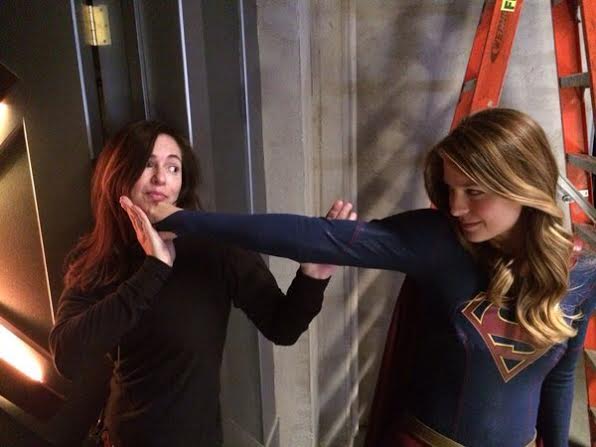
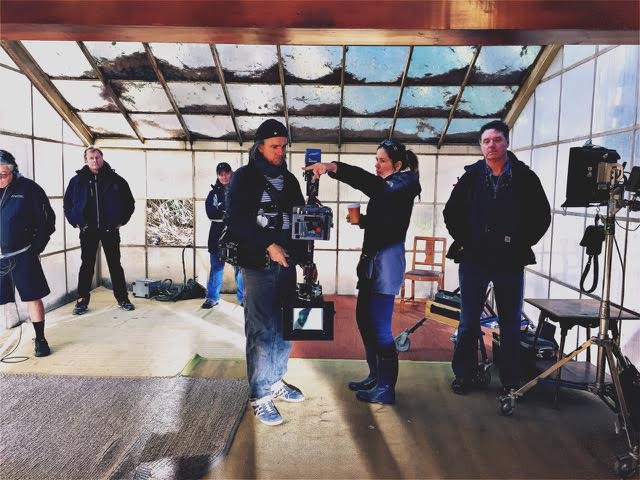
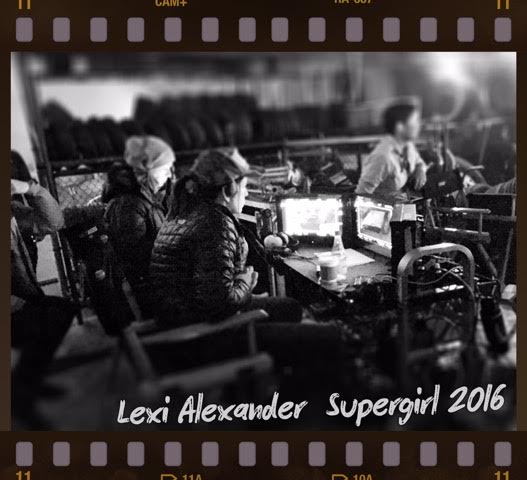
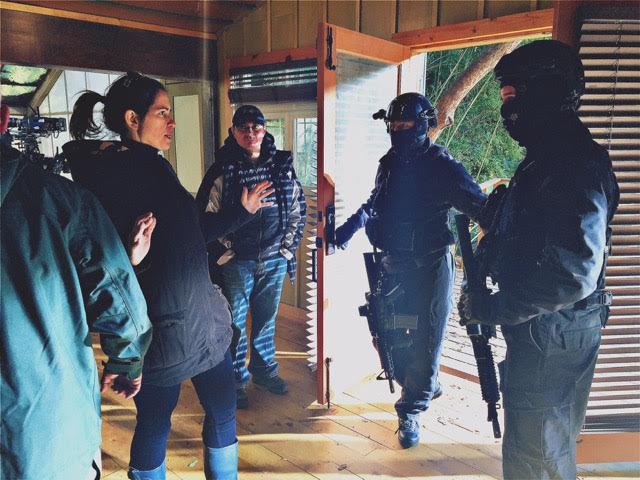
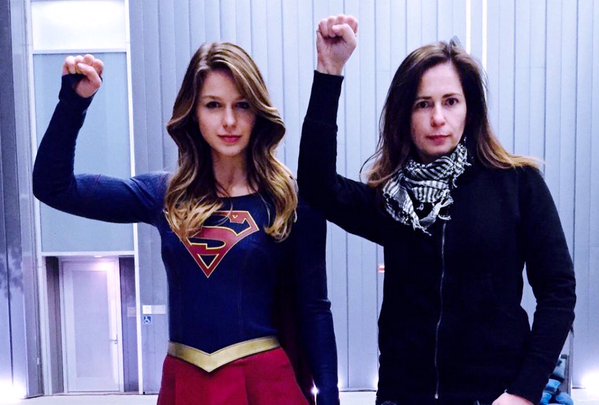
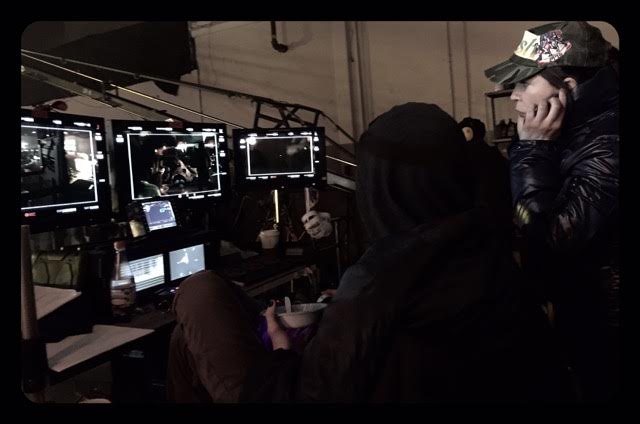
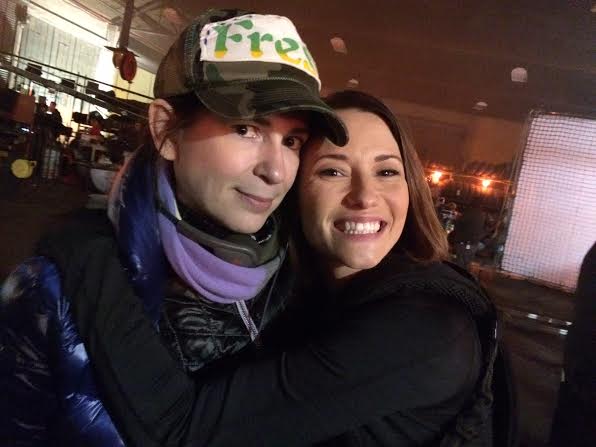





Published: Feb 21, 2016 11:00 am